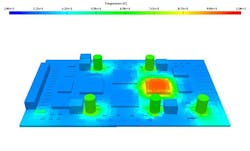Design and development tool for solder analysis during temperature cycling introduced by DfR Solutions
BELTSVILLE, Md. – DfR Solutions in Beltsville, Md., is introducing Sherlock Automated Design Analysis software version 5.3 design and development tool with thermal-mechanical analysis that enables users to capture system-level effects on solder joint reliability during temperature cycling.
Thermal issues are at the root of many product failures in today's electronics designs. Modern products are more complex, smaller, require more power, and operate in more extreme environments than ever before, DfR officials say.
The more complex the design, the greater the thermal strain on the components. To help reduce this risk and ensure more reliable products, electronics manufacturers conduct time consuming and costly thermal-mechanical analyses on their devices.
Sherlock Automated Design Analysis Software uses a physics of failure approach to indicate when thermal temperatures are too hot for integrated circuits and solder joints.
Related: DfR Solutions launches Sherlock automated design analysis software
The new thermal-mechanical capability now available in Sherlock version 5.3 enables users to run thermal-mechanical analyses quickly in Sherlock and eliminate time-consuming data-entry. Using Sherlock's thermal-mechanical analysis can provide thermal profiles of product designs early on in product development.
The thermal-mechanical analysis in Sherlock enables design improvement by changing component type, material parameters, and or layout to minimize loads during thermal expansion. Understanding the interaction of mounting points and components during thermal expansion assures a more reliable PCB layout under thermal-mechanical stresses.
For more information contact DfR Solutions online at www.dfrsolutions.com.
Ready to make a purchase? Search the Military & Aerospace Electronics Buyer's Guide for companies, new products, press releases, and videos

